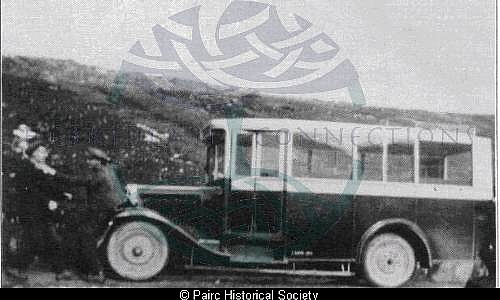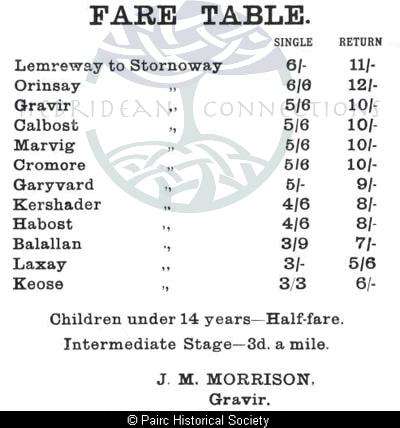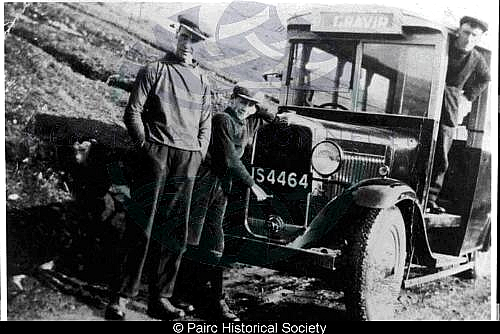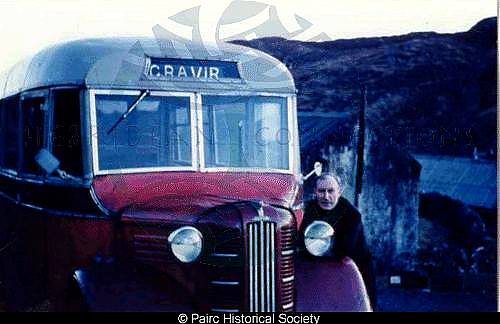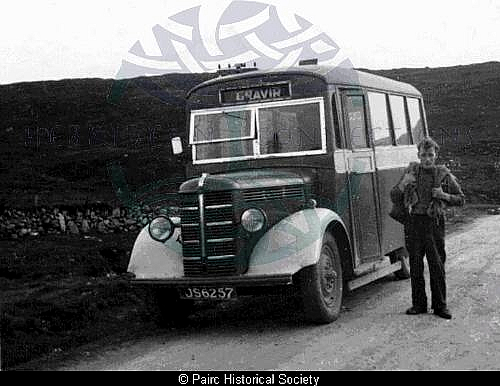720: Life and Times of the Ledidh
Reminiscences by John Murdo Morrison, the Ledidh, Gravir. See also the original Gaelic transcription, parts one and two.
My father was known as Domhnull Moil. He was a shopkeeper. He built a shop Buth Domhnull Moil by the shore down near the Gravir old school in 1901. My grandfather Murdo Morrison came from Marvig – and he was known as Murchadh Aonghas ‘ic Ailean. He married Isobel, my grandmother. Her sister was married to Eachainn Choinnich at croft 43, Gravir.
My father was aged 29 when he opened the shop. He built it near the shore so that it would be easy to unload cargo from the boats to the shop. The Gravir headmaster at that time came from Uig, and he had a young Uig girl working for him. Her name was Bellann. That is how my mother and father met – working beside each other – then they got married. They built a loft over the shop and lived there until they built a new house on No 44. It was in that loft that their oldest boy, Murdo Alex was born.
My mother’s father was from Tolsta – Murchadh Buidhe. My father’s mother came from the Nicolsons in Crowlista. It was one of these Nicolsons [probably Norman Macdonald, his uncle] that built the first house at No 44. He was a stonemason, and very good with his hands – carving, cleaning and shining the stones. I remember the house getting built.
Donald’s shop was quite big for those days. It stocked everything from flour, corn, sugar, and bran to clothes and household goods. It was open all day until eleven at night with people constantly in and out. In those days there were a lot of people in the village with houses of up to ten in a family. Two people would work in the shop on a Friday and Saturday, and they were run off their feet keeping up with customers. And with the school next door, the children would be in and out all week. As there were no roads then, the stock arrived by boat. While he ran the shop, he had three boats: – "City of Rome", "Touch Me Not", and "Stella Matina". His last boat was called "Jessie", and she had an engine.
There were five boys in our family: – Murdo Alex, Alex P, Donald John, wee Donald, and myself. My mother died while giving birth to wee Donald. She was only 33, and I was seven years old. I remember her well working in the house and looking after us. My father died in 1937, aged 65. He had been ill for two years and had gone to Glasgow Western Infirmary for an operation. By then he had remarried, and had another two girls.
After that Murdo Alex ran the shop during the War until Donald John returned. The shop had run down a bit but Donald John started going round the villages with a van selling groceries and butcher meat to make a living as the population of Gravir had gone down o much. It was the lack of people that closed the shop in the end, over fifty years after it opened.
The road between Balallan and Habost opened in 1926, and in the following year we got a Ford 7 seater bus, which Murdo Alex ran between Gravir and Stornoway. It was not long after that that I started driving the bus, and I enjoyed my job for nearly forty years. Each village had a gate – there were eleven of them between here and Stornoway. The children would help me by opening and closing them, but sometimes I had to do it on my own which delayed me somewhat. I would travel the island with the bus, sometimes overflowing because of communions, weddings, funerals and excursions. At times I would have to go to town for a coffin, and then take the funeral party to the cemetery. At weddings I would go round the villages bringing people to the wedding. I would take the bride- to- be to town for her gown and her ring. She could get a ring for three shillings out of McGillvary’s shop. She would be happy with that. The bride would also get a creel in ‘An Cruaidh’s’ shop.
When the War started in 1939 I was enlisted at once, and joined the Navy. I spent seven and a half years on H.M.S. Derbyshire doing patrol in the Atlantic. Our ship was called there to escort the cruisers "Renown" and "Repulse" over to Singapore. Unfortunately I took ill on that voyage and had to be put ashore in Capetown to go to hospital. When I recovered, they put me on duty in the Naval headquarters in Capetown where I spent 3 years. I stayed there again until I was discharged in 1944 due to ill health again. I returned home and gradually recovered. My bus had lay idle in the garage all the time I was at war, so I decided to repair and do it up for the road again. It wasn’t long then before I was earning a living again. Although Murdo Kennedy from Orinsay and Ian Sheonaidh Ruairidh from Marvig also ran buses, there were enough people travelling at that time to keep all of us on the road.
I then got a plot to build a house just up from The Free Church in Gravir. Things were going very well for me at that time. The War was over, and those that were called up had come home – those that survived anyway. The villages were overflowing with people – each with there own tales of trial and hardship or the wonderful things they had seen on their travels. Although there was still a certain scarcity of essentials we were relaxed and relieved of the War. People looked forward to building a new life at home. The boats were launched, new looms were in the sheds, and new houses were built on crofts that were now worked anew. There were also weddings – plenty of them, and it was at that time Aggie and I got married. She was the daughter of Ian Mor Macrath from Habost. Through time we had our family – Donald first, then Ann. The years passed quite contently at home. We worked hard and were satisfied.
I would say it was about ten years after the War that I noticed the increase in the number of cars on the road. People were going up in the world, and young men were returning from the sea and the whaling with vans and lorries. As a result we lost a lot of our customers, because folk would take the van to Stornoway the night before they travelled to the Mainland.
Many new laws came into force regarding the roads. Traffic Commissioners were employed to inspect buses annually. That put running costs up at the same time as passenger numbers were going down. In the end I stopped doing the ferry runs, but continued a daily service to Stornoway until 1967. After that I retired, over forty years after starting.
The world changed dramatically during these forty years. In 1926, the road was being built between Habost and Shieldinish, and four boys from Gravir were working on it – they were Domhnull Angie Rob, Seonaidh Murdo Sheonaidh Iain, Chris Choinnich Thormoid, and his brother Calum. I would take them over on Monday morning, and bring them back on Friday night. During the week they would stay in an empty house on croft 5 in Habost.
But despite all the changes, there still runs a bus from the district to Stornoway. They have an easy life nowadays; unlike the hard work and effort we had to put in to keep up with the rules, timetables, and public demands. They are also slower today; a bus will not overtake a car unless it has stopped. It is also more expensive; the old ladies tell me that they won’t be left with a shilling to bury them. "Remember now to include that!" The present bus driver is always pulling my leg saying how slow I was wasting time blethering away to the people that were putting their trust in me. I spent over forty years on the buses, and as I already said they went by in a flash. I was young; the villages were full of people who kept me busy.
Despite that, still many obstacles came my way with poor winter weather, poor roads, and accidents that could happen anytime. Seonaidh Ciorstaidh and I would take it in turn to meet the ferry each evening. Sometimes it was after midnight when she would come in, and then there might not be anybody from South Lochs on board. There were no gritters or salt lorries in those days and it was extremely difficult to negotiate the roads in the snow. I would put chains round the wheels to make it easier, but even then it was very dangerous driving with snow and ice on the road. We had quite a responsibility taking people home safely.
There was one freezing winter’s night with a lot of snow; and we came to the steep hill in Calbost next to the river. Neil Sunt was with me, and he tried to jump out to put a rock behind the wheel, so we could try to edge up that hill. We were about three feet from the top when the back wheels gave way and the bus just slid down to the bottom. There was nothing I could do until it stopped. Poor Neil got thrown out into the snow. Fortunately it followed the tracks we had made on the way up and stopped at the bridge. Neil was convinced that I would go somersaulting into the river but we were safe.
In those days the buses had thick bumpers, and only a mighty blow could cause any damage. If there was an accident the police took nothing to do with it, as there was no insurance then. Any disputes in an accident were resolved between the drivers themselves. If you went off the road or bumped into a rock, you just took the bumper off and hammered out the dent until it was smooth again. You had to give it quite a whack to get it smooth properly.
There was another time I was returning from Stornoway about one o’clock in the morning. I had only one passenger from Calbost. It was snowing heavily. When I reached Marvig it was evident that I could not get past Alan Sheonnie’s house. You couldn’t see the road for the snow, it was falling so heavy, and the wind was rising. There are quite dangerous corners between Marvig and Gravir, but my passenger refused to get off the bus, so I had to try something to get him home. The bus couldn’t climb the brae between the two lochs as you leave Marvig, and it slid off the road. The Calbost man took his bag and headed for home through the snow without saying a word or offering to help me out of the ditch. Well, I spent the rest of the night moaning while I struggled to get the bus back on the road with a spade and planks.
That was how things were at the end of the War – there were that many buses on the road that I had to be on the ball and leave at the right time in the morning, although sometimes I only had time to grab a cup of tea and change my shirt as I had only just got home from the previous day’s run.
I remember another day driving quite contently near the halfway house on the way to Stornoway. I was in a world of my own when I noticed a wheel going past through the corner of my eye. I thought it was a lorry that was overtaking, but before I knew it the bus had gone onto the verge at the side of the road, but luckily I managed to keep the bus from going off completely. The wheel carried on rolling down the road – I was frightened stiff in case another car would come round the corner into it. Eventually, it stopped near the quarry. I got off the bus and walked down to the quarry, saw that the wheel was too big for me to shift and it was blocking the road, but it was not long before other people arrived to help put the wheel back on to the Ranish bus. There was a team of strong men to lift the bus onto a stone bank, and fit the wheel. I was back earning my living within twenty minutes.
Funny things happened too. I got word one evening to take the Councillor to the ferry, as he was to attend a meeting in Perth. It was Donald Mackay, Kershader – Domhnull a Phuist – that was councillor then, and he quite often phoned me late like that as it was at half-past -eleven the ferry left Stornoway for Kyle. When I was getting ready to leave Alex Dan Ian Bhan wanted to come with me as I was returning at once. We arrived in town just as the fishing boats had landed their catch, and the pier was jumping with the fish. Donald went down amongst the fishermen and buyers, and returned with a huge eel, which I was to drop in to his brother on the way back through Kershader. Alex Dan went into a pub and bought three ‘screw tops’ (bottles of beer), and we set off for home.
By the time we reached Balallan Alex Dan had downed two screw tops, and was looking for the third. He couldn’t find it anywhere and thought that I had hidden it. In the end we concluded that it had fallen out the door and it was gone. I delivered the eel to Donald’s brother, and returned to Gravir without another thought. On the following day, Donald’s brother was waiting for me at the side of the road when I was going through Kershader with a parcel under his arm. I stopped. "Look at what I found when I gutted the eel last night – a’ screw top’ without a drop taken out of it." Without letting anything on, I said "Goodness me". I took the bottle back to Alex Dan, and I never heard such laughter in my life. We never told Donald’s brother where the bottle came from, and I often remember that day.
Comann Eachdraidh na Sgire Pairc
Details
- Record Type:
- Story, Report or Tradition
- Type Of Story Report Tradition:
- Story
- Record Maintained by:
- CEP
